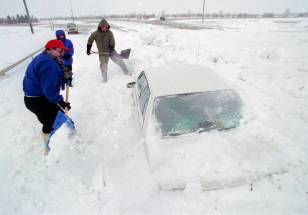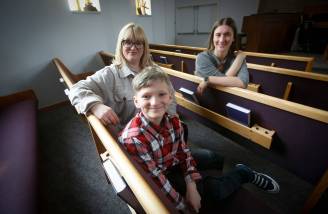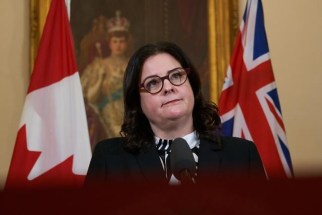From Ukraine, with gratitude and regret Two frightened, exhausted and relieved mothers and one mom-to-be reflect on difficult decisions to flee their war-torn nation and the arduous journeys to safety in Winnipeg
Read this article for free:
or
Already have an account? Log in here »
To continue reading, please subscribe:
Monthly Digital Subscription
$0 for the first 4 weeks*
- Enjoy unlimited reading on winnipegfreepress.com
- Read the E-Edition, our digital replica newspaper
- Access News Break, our award-winning app
- Play interactive puzzles
*No charge for 4 weeks then price increases to the regular rate of $19.00 plus GST every four weeks. Offer available to new and qualified returning subscribers only. Cancel any time.
Monthly Digital Subscription
$4.75/week*
- Enjoy unlimited reading on winnipegfreepress.com
- Read the E-Edition, our digital replica newspaper
- Access News Break, our award-winning app
- Play interactive puzzles
*Billed as $19 plus GST every four weeks. Cancel any time.
To continue reading, please subscribe:
Add Free Press access to your Brandon Sun subscription for only an additional
$1 for the first 4 weeks*
*Your next subscription payment will increase by $1.00 and you will be charged $16.99 plus GST for four weeks. After four weeks, your payment will increase to $23.99 plus GST every four weeks.
Read unlimited articles for free today:
or
Already have an account? Log in here »
Hey there, time traveller!
This article was published 11/04/2022 (1338 days ago), so information in it may no longer be current.
While Russia’s war on Ukraine continues, Manitoba’s population has slowly grown to include refugees seeking peace far from home.
The Free Press spoke with three Ukrainian women — two mothers, one soon to be — about their harrowing escapes from the terror and about acclimating to their new lives more than 7,000 kilometres away.
•••
For a month-and-a-half, Victoria Akimkina slept fully dressed, even wearing an outdoor jacket. As war took hold in Kharkiv — a city of about 1.5 million in northeast Ukraine — she had to be ready to run at any given time.
Akimkina, 30, lived in Kharkiv for much of her life. She and her husband, Max, were excitedly expecting their first child.
Then, on Feb. 24, they woke up to the sound of bombs exploding.
Food began disappearing from supermarket shelves. In a matter of days they were without electricity and water had become scarce. They began sleeping on the floors of the metro station with hundreds of other people when their home became impossible to live in.
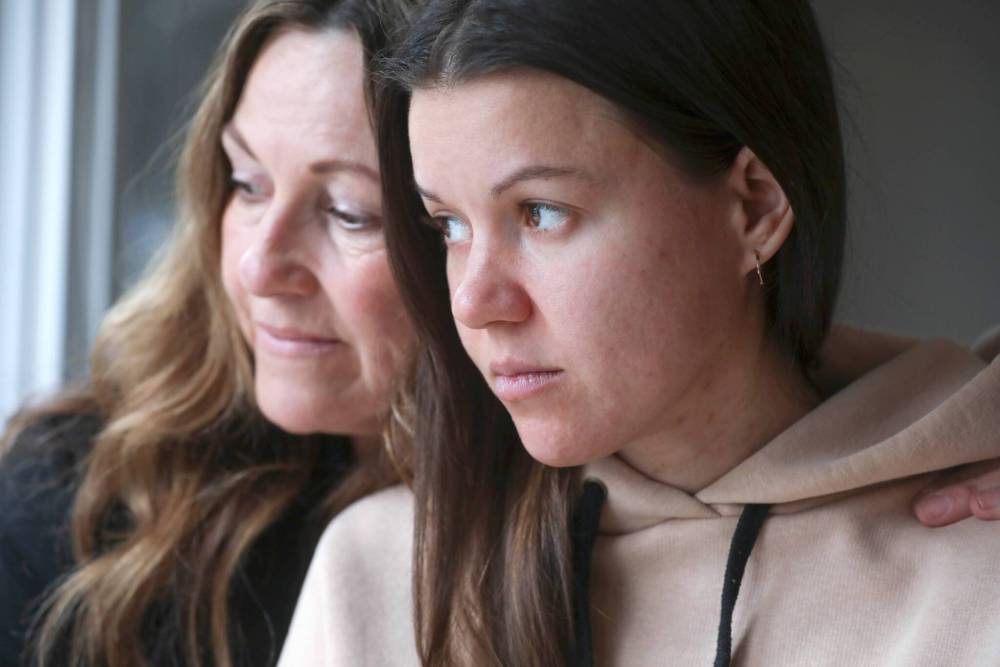
She began experiencing pain and bleeding related to her pregnancy, but when her husband called for an ambulance, he was told she wouldn’t be able to receive medical attention because the area was being bombed.
What came next was a brutal decision for the couple.
“My husband understands that this is super-dangerous for me and for baby to be there,” Akimkina haltingly tells the Free Press.
She puts her face in her hands, turning away to hide sudden tears. She can barely get out the words.
“He forced me to leave the city. He found one man who would take me to the railway station.”
Even the ordeal of getting on the train out of Kharkiv to the western city of Lviv near the Polish border, a safer area at the time, was “horrible,” she says. About five months pregnant, she was forced to push and shove to get a seat for the 26-hour journey in total darkness and without food or toilets. When she arrived in Lviv, she was fed and taken to an emergency ward to check on her pregnancy.
But she knew she couldn’t stay in Ukraine.
“I understood that I can’t be there anymore, because it’s very difficult,” she said. “You hear all the sirens and these bombs and you don’t feel that you’re safe at all, you can’t fall asleep like a regular person.”
“I understood that I can’t be there anymore, because it’s very difficult… You hear all the sirens and these bombs and you don’t feel that you’re safe at all, you can’t fall asleep like a regular person.” – Victoria Akimkina
That’s when she connected with Winnipegger Tina Wiebe-Carl.
Wiebe-Carl, a mother of four, real estate agent and self-described empty-nester, had signed up on multiple online databases of potential hosts for Ukrainian refugees. When Akimkina reached out to her using one of those databases, she rushed to get her home ready, and not just for one visitor.
“I have an extra bedroom, and I was like, ‘I gotta do something.’ We had a separate bathroom, couch,” she says. “How hard is it for people to do this?”
After a video call from Lviv, host and guest decided to take a risk. Wiebe-Carl would provide Akimkina a safe haven and help her get acclimated to Canada. Akimkina, after making it out of Ukraine and into Romania, would travel to Winnipeg.
With just a backpack and a plastic bag carrying her belongings, she arrived at James Richardson airport on a work permit Wednesday night.
She spent a few days getting much-needed sleep and eating to get her strength back. Now, with Wiebe-Carl’s help, she’s looking for work, meeting other local Ukrainians in the community, and trying to get a Manitoba Health card so she can access prenatal care for the baby — a boy; she’s afraid her unborn son is feeling neglected by his mother.
“You know, sometimes I even forget about this?” she says, gesturing toward her belly. “Because you think about all this (other)stuff.”
But there are things she can’t forget. In her sleep, she’ll jolt awake to the sound of bombs that aren’t falling from the sky. Every time she hears an ambulance peeling down a Winnipeg street, she’s back to being fully dressed on a metro-station floor.
She points to a small airplane flying overhead while she speaks.
“Do you hear? This sound is like when bombs are flying to you,” she says.
“Even living here, you understand that you’re in a safe place, but your brain and your body doesn’t allow you because from every sound, you feel that you need to run, or you want to fall on the floor.”
She and Max have been apart a long time now, but they’re finally able to speak to and see each other on video calls; he’s in a village in Lviv. They’re in mourning; their country has been forever altered.
“Even if the war finishes tomorrow, I won’t go back, definitely, because we don’t have homes there,” she says. “Our Kharkiv is destroyed totally.”
Now, all she can do is wait for their son to arrive and for her love to make it out of Ukraine safely, at some point.
“We just pray the war will finish soon. And I hope that it finishes, and my husband will come to Canada and maybe we will live here? I think so. I don’t know,” she says.
“I just wish to get from him (the) message ‘I’m not in Ukraine.’ This is what I wish for.”
•••
Alina Roshko’s husband Oleg was volunteering near Ukraine’s border when he realized the gravity of their situation two days after Russia invaded.
“He came home, opened the door and said, ‘You have to leave now,’” Roshko says.
“He said, ‘I saw how many women and children are trying to leave Ukraine. It’s very scary, and I think that you must take the kids and go.’”
With three backpacks, Roshko, their nine-year-old son Dima and four-year-old daughter Mia got in a car, said goodbye to Oleg and drove 52 hours to the Czech Republic, a trip that, under normal circumstances, took 17.
Roshko’s younger sister Valerie and her husband, Jim Cheng, live in Winnipeg, and were “living in two different time zones” before their fleeing family members arrived here.

“Once (they) left Ukraine for the Czech Republic, we started the visitor’s visa application, but there was very little that we could do to help other than apply and wait,” Jim Cheng says. “Valerie still talks to her sisters, mom and grandparents every couple of hours, just to make sure they’re safe.”
Years before the war, the Chengs tried to secure visitor visas for Alina and the kids twice, to no avail. This time, when they applied, it took a month and $960 out of pocket to get them into the country, despite Canada’s promise to waive fees.
Roshko says she would have stayed in Ukraine if not for her children. Her pregnant younger sister Mallory and her mother, a school principal, chose to remain.
“For two days, I couldn’t phone my husband because I was crying all the time, but I knew that I needed to be strong for my kids,” Roshko says. “For Dima, he knew the real reason we left, but for Mia, it’s like she’s on vacation, (although the kids) also didn’t want to phone Dad in the beginning because they were scared for him.”
When they got to the Czech Republic, Roshko and the kids waited for more than a month before their visas were approved. During that time, they stayed with a host family and another refugee family. The flight to Canada took them through Germany and Montreal before they landed in Winnipeg.
“A ridiculously small number of people have made it to Canada, and the Ukrainian Canadian Congress Manitoba told us that there’s not many people here because the visa process is so long and complicated,” Jim Cheng says.
“For two days, I couldn’t phone my husband because I was crying all the time, but I knew that I needed to be strong for my kids.” – Alina Roshko
“There are many people that would like to help — we would like to help — but there’s not much that we can do here until that changes.”
In March, the UCCM branch said 157 Ukrainians had contacted the organization for information on moving to the province. Offers to shelter refugees poured in; staff stopped taking information when the number reached 700.
•••
Explosions reverberating through the night jolted Yulia Trygubniak from what would be the last restful sleep in her own home, triggering a decision that would bring the young mother to Winnipeg.
From her home in Boyarka, a suburb on the outskirts of Kyiv, the 32 year old could hear the devastation of the late February Russian attacks on Irpin, about 30 kilometres north of where she lived with her four-year-old son and husband.
“I was very afraid,” Trygubniak recalls during a conversation at the Ukrainian National Federation in Winnipeg’s Point Douglas neighbourhood. “I didn’t know what to do in that time, to bring (my son) somewhere in the (apartment), or to cover by myself. I didn’t know whether something would fall down or not.”
“The next day, we just packed our things,” she continues. “I took everything that I could take. I didn’t plan; I didn’t think about it. It was very difficult.”
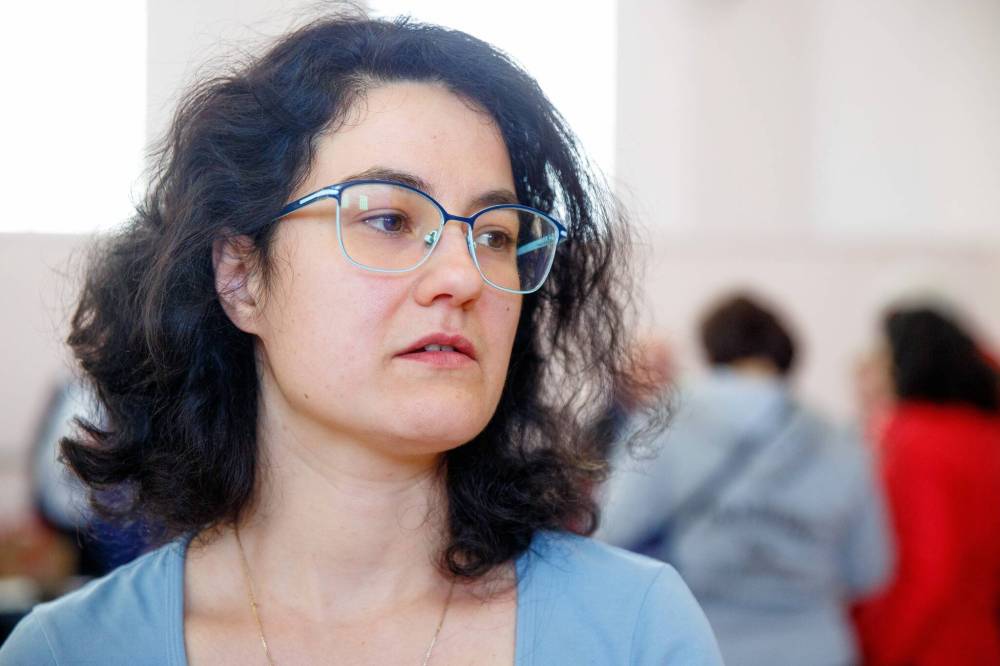
Trygubniak arrived in Winnipeg last Thursday with her son and husband after a difficult month that saw her reluctantly leave Ukraine — forced to leave her aging in-laws behind — and traverse across Europe to catch a flight out of Lisbon, Portugal bound for Toronto.
Trygubniak and her family had been approved to immigrate to Canada in late 2021 and planned to move to Winnipeg this coming June. Their plans were upended and the immigration process expedited because of the war.
In Winnipeg, she was reunited with her sister, who has lived in the city for about eight years. Her father, who boarded a plane in Poland destined for Canada, had arrived weeks earlier.
However, Trygubniak and her husband are anxiously waiting to be reunited with the family matriarch, who stayed behind in Stoyanka, a tiny village on Kyiv’s outskirts, to take care of her ailing husband. Trygubniak says her father-in-law died not long after they were forced to flee the region.
“The next day, we just packed our things,” she continues. “I took everything that I could take. I didn’t plan; I didn’t think about it. It was very difficult.” – Yulia Trygubniak
He was buried in the yard of their family home by neighbours while Russian troops occupied the village. Trygubniak’s mother-in-law was able to escape with neighbours and is now living with family in Italy while waiting on the documents that will allow her passage to Canada.
“She said, ‘I just want to come here in Winnipeg and to have a home,’” Trygubniak says.
Until that time, Trygubniak says she is focused on rebuilding her life in Winnipeg. She is on the hunt for daycare for her son and a car so she can eventually begin working.
While the stability of being with her family in Winnipeg has offered some relief, Trygubniak says she continues to have dream about having to flee her home and her waking hours can be equally as difficult.
“It’s a very difficult situation for everyone, and none of us thought it would be like this,” she says, adding the help her family has received from across Manitoba has been a comfort through the grief.
“It is very precious,” she says.
malak.abas@freepress.mb.ca
danielle.dasilva@freepress.mb.ca
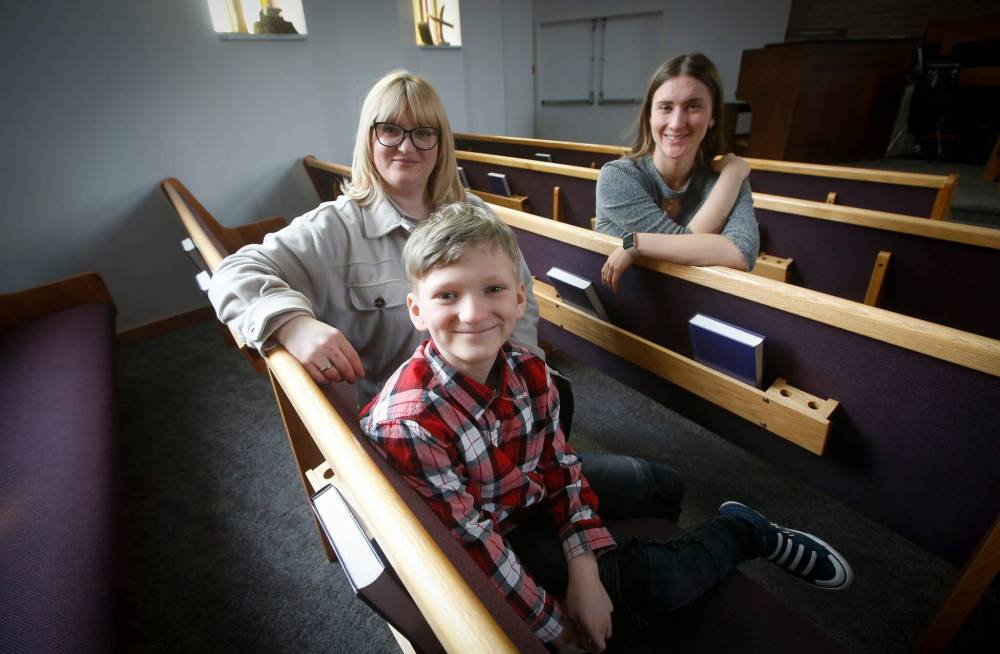


Our newsroom depends on a growing audience of readers to power our journalism. If you are not a paid reader, please consider becoming a subscriber.
Our newsroom depends on its audience of readers to power our journalism. Thank you for your support.
History
Updated on Tuesday, April 12, 2022 7:15 AM CDT: Updates photo caption



